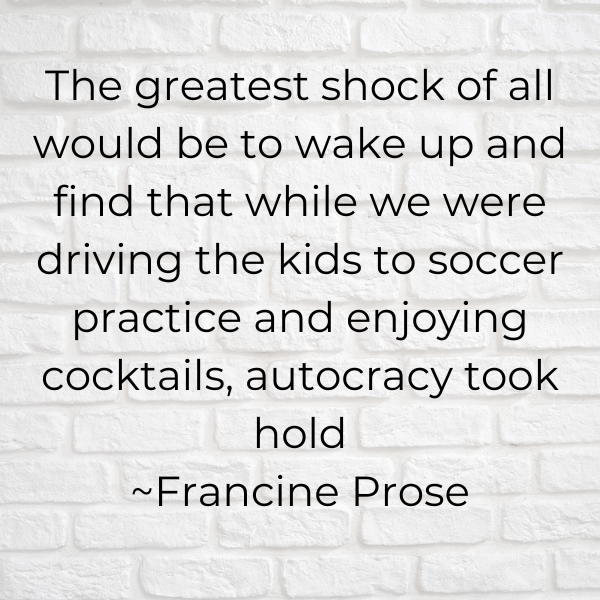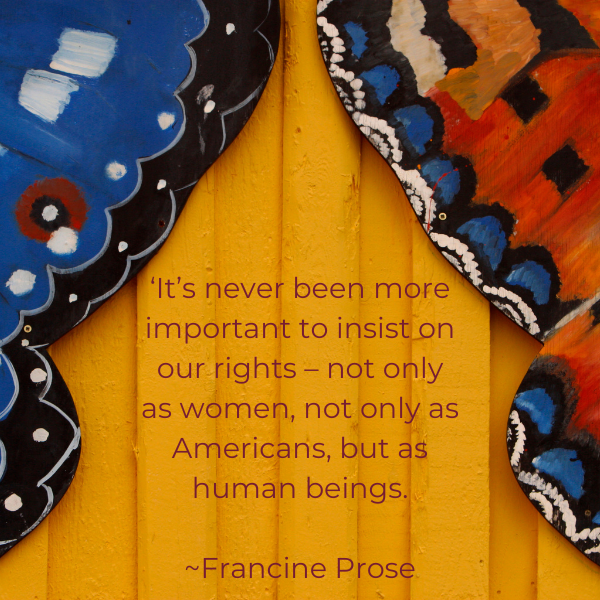We Americans are Dancing on the Titanic. Our Iceberg is Not Far Away
 By now the US supreme court’s overturning of Roe v Wade hardly comes as a surprise. We’ve known this was imminent since the leak, a month or so ago, of Justice Alito’s memo. And yet it still delivers a profound shock – in fact, a series of shocks. Stunned, we ask, how could this happen? as if we hadn’t known, for weeks, that it was a more or less done deal.
By now the US supreme court’s overturning of Roe v Wade hardly comes as a surprise. We’ve known this was imminent since the leak, a month or so ago, of Justice Alito’s memo. And yet it still delivers a profound shock – in fact, a series of shocks. Stunned, we ask, how could this happen? as if we hadn’t known, for weeks, that it was a more or less done deal.
What’s shocking is the actualization of the scary Handmaid’s Tale scenario: our growing suspicion that Margaret Atwood’s fictional dystopia – a society in which women are forced to bear children and brutally punished for disobedience – is nearer to becoming a reality than we might have imagined. What’s shocking is this proof of the court’s desire and ability to control and punish women, to deprive us of our constitutional rights. What’s shocking is the justices’ reckless disregard for the additional suffering that this ruling will cause poor women, women of color and those living in rural areas. What’s shocking is the memory of three of the current justices swearing, under oath, to preserve the precedent established by Roe v Wade.
It’s time to say it: the US supreme court has become an illegitimate institution
What’s shocking is the realization that we are living in a country that now boasts some of the world’s most misogynist and repressive laws. What’s shocking is the knowledge that the institution I grew up seeing as committed to the most precious guarantees of the constitution and to the highest and most sensibly bipartisan ideals of justice is now in the hands of a powerful faction of extremists.
 But what shocks me most is the fact that, according to surveys that keep surfacing and being reported, a substantial majority of Americans support abortion rights and oppose the outright ban. According to the latest Gallup poll, 85% of the population believes that abortion should be legal under some circumstances. What’s noteworthy is not that high number so much as the discrepancy between that figure and the substance of the supreme court ruling. What’s shocking is yet another fact that we have known or suspected for some time: that we are living under minority rule, that, in some of the most essential ways, the wishes of the majority no longer determine government policy, and that it has become a kind of joke to suggest that our government, at the highest level, is responding to “the will of the people”.
But what shocks me most is the fact that, according to surveys that keep surfacing and being reported, a substantial majority of Americans support abortion rights and oppose the outright ban. According to the latest Gallup poll, 85% of the population believes that abortion should be legal under some circumstances. What’s noteworthy is not that high number so much as the discrepancy between that figure and the substance of the supreme court ruling. What’s shocking is yet another fact that we have known or suspected for some time: that we are living under minority rule, that, in some of the most essential ways, the wishes of the majority no longer determine government policy, and that it has become a kind of joke to suggest that our government, at the highest level, is responding to “the will of the people”.
Meanwhile, these shocks are intensified and amplified by how little we seem willing or able to do about the slow-motion stealth with which the seeds of autocracy are being planted. “We’re living under minority rule,” we say, and then go on to plan the kids’ birthday parties, to try to find a job and pay the bills, to complain at the gas pump, see our friends, celebrate the good weather and the new freedom occasioned by the latest downturn in the pandemic. Social media is abuzz with valuable – and necessary – suggestions for circumventing the new measures: how to obtain abortion pills from abroad, how to help women travel to states where abortion is still permitted. But I have yet to see a truly viable and broad-based plan for influencing the legislators of the so-called “trigger states” that have outlawed abortion in the immediate wake of the supreme court ruling.
 It’s hard not to notice that our passivity is being encouraged by the mainstream media’s commitment to “fair and balanced” reporting. In the coverage I watched on the night of the ruling – not only on the primetime channels but on PBS – equal time was given to the exultation of the “pro-life” (that regrettable term suggesting that its opponents are anti-life) faction and to the anger and disappointment of women who wish only to maintain control over our own bodies. How can it not add to our sense that the country is equally divided, deeply and hopeless factionalized, and therefore that nothing can be done? In fact, the two sides are not equal, but one side is grievously underrepresented in the places where it matters most.
It’s hard not to notice that our passivity is being encouraged by the mainstream media’s commitment to “fair and balanced” reporting. In the coverage I watched on the night of the ruling – not only on the primetime channels but on PBS – equal time was given to the exultation of the “pro-life” (that regrettable term suggesting that its opponents are anti-life) faction and to the anger and disappointment of women who wish only to maintain control over our own bodies. How can it not add to our sense that the country is equally divided, deeply and hopeless factionalized, and therefore that nothing can be done? In fact, the two sides are not equal, but one side is grievously underrepresented in the places where it matters most.
It’s never been more important to insist on our rights – not only as women, not only as Americans, but as human beings. We need to talk to our friends, make plans, apply unceasing pressure on our state and local governments, hold every political candidate accountable. We may need to forget our pressing worries over inflation and gasoline prices just long enough to take to the streets, with unceasing frequency, and in greater numbers, in order to make our beliefs and our voices heard.
Because the greatest shock of all would be to wake up one morning and find that while we were driving the kids to soccer practice and enjoying that welcome after-work cocktail, more and more of our rights had been stripped away, as has happened in so many countries in which democracy vanished, overnight and in darkness –when, as it were, no one was looking. The overturning of Roe v Wade should shock us even more than it already does – shock us into looking beyond the dance floor of the Titanic and spotting that iceberg, looming in our path, not so very far away.
This article was originally published in "THE GUARDIAN"
 Francine Prose is the author, most recently, of The Vixen. She was also the president of Pen America
Francine Prose is the author, most recently, of The Vixen. She was also the president of Pen America
THE 2,000-SQUARE-FOOT vegetable plot—planted with fava beans, peas, arugula, raspberries, even artichokes—that author Francine Prose ’68, A.M. ’69, cultivates at her upstate New York home has become, she says, “an obsession. Sometimes I think I write for a few hours a day so I don’t have to feel guilty about working in the garden.”
After more than 30 books, the first published when she was 26, Prose’s guilt should be nicely quelled. Her novels include Blue Angel (2000), a finalist for the National Book Award, and Household Saints (1981), which was adapted into a film. She’s written short stories, young-adult and children’s books, and nonfiction works including the New York Times bestseller Reading Like a Writer (2006) and, most recently, Anne Frank: The Book, the Life, the Afterlife (2009; appearing in softcover this fall). Prose writes everything except, well, poetry.
“Francine is one of the great writers of her generation,” says James Atlas ’71, president of the publishing imprint Atlas & Co., a friend since their college days. (Prose’s 2005 Caravaggio: Painter of Miracles is part of the firm’s Eminent Lives series.) Comparing her to Virginia Woolf, Atlas describes Prose as “a versatile woman of letters in the old-fashioned sense,” and novelist Larry McMurtry, in his review of Prose’s Bigfoot Dreams (1986), called her “one of our finest writers.”






